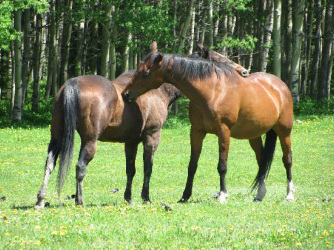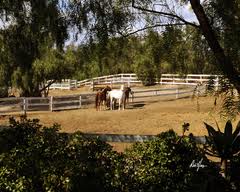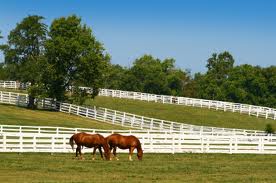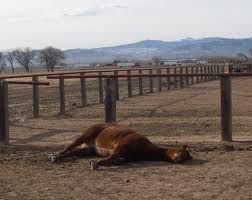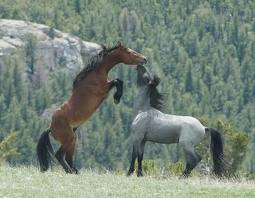Really....have you thought about what is a horse...
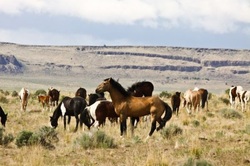
If you are like most horse lovers, you may never really given thought to what kind of creature a horse is. That was my experience growing up. I was taught, as a child and into my young adulthood, that a horse is a horse and what is important is picking their feet, brushing them, feeding them hay 2 times a day, saddling them
up any old way, pulling the reins to stop, kicking the horse to go, sitting up straight,shoulders back and that was that. Sometimes, my trainers would even saddle up for me - what I did not realize is that I was missing out on the most important "training" I would need to be good with horses - understanding the needs of a horse and working on my own emotional, physical and mental fitness. There are no "horse" problems, only human problems put into the horse.
At the most basic level, to be safe around horses, it really benefits us to understand the horse, from nature's perspective (this is critical if you have a child taking "lessons" or around horses in any fashion). As I searched for a better way with horses, I started learning more and more about the nature of the horse, the physiology of a horse, their basic needs and tendencies put in there by nature.
I would like to share these with you, starting with the facts. Horses are prey animals, herd animals (meaning mother nature made them to live with other horses, never alone), movement animals. Their value system includes safety, comfort, play and food. Let me say this again - THEIR value system (by nature) is safety first, comfort, play and then food. Far different than the humans of love, praise, recognition and material things.
Lets start with what a prey animal is. Prey animals get eaten by other animals. A horse doesnt have fangs or claws - there main protective mechanism is flight - and a horse, by instinct, will flee first and ask questions later - their life depends on it. So when a horse "spooks", they are only doing what mother nature put into them. We as humans, are predators - the exact opposite of a prey animal.
Domesticated horses have a greater challenge than feral horses as they have to learn to live in a human environment and figure out what is safe and not in such an unnatural setting.
Horses have the largest eyes of any land mammal. They can see out of each eye individually, as well as with both eyes. In contract, humans have monocular vision - we see out of both eyes together. Horses have excellent distance perception but poor depth perception (which would explain why a horse may be hesitant in crossing a small puddle).
Horses also have excellent night vision but it takes time for the horses eyes to adjust from dusk to night - so that may be a challenging time for your horse.
Horses are herd animals. They are made, by nature, to live with other horses. When they are denied this very important need, they become mentally perverted (as seen by so called stable vises, such as cribbing and wind sucking etc.) Those perversions are put in the horse by their human owners who do not understand how to properly care for a horse. A horse needs, by nature, to have the opportunity to touch and groom another horse. Seeing another horse, is not enough for their herd need and keeping a horse in solitary confinement or alone is simply not acceptable, again by sciences' own measurement.
Horses in a herd have a hierarchy ( a pecking order) with the most dominate horse being the leader - leadership is tested constantly as the welfare of the herd depends on the strength of the leader. In a domesticated herd, the leader could be any horse. In feral horses, the leader is usually a mare.
Horses in a herd have a hierarchy ( a pecking order) with the most dominate horse being the leader - leadership is tested constantly as the welfare of the herd depends on the strength of the leader. In a domesticated herd, the leader could be any horse. In feral horses, the leader is usually a mare.
Horses are grazing animals. Their whole digestion is set up to have food continuously through the system 24 hours a day. They require about 2% of their ideal body weight in hay per day.
Did you know that horses can sleep both standing up and lying down? Unlike humans, horses do not sleep for long periods at a time. On average, horses sleep only 3 to 4 total hours every day. You can imagine then, how bored a horse that is stabled must be!!!
Horses are movement animals, designed by nature, to move hours and hours every day. In fact, their hoof health depends on it. A horse is not designed to stand in a stall or horse run for hours on end. Not only does this again, create "stable" vises (created by their owners) but it actually decreases the overall health of the horse. The hoof pumps blood through the hoof to the rest of the horses body and without movement, that blood flow diminishes. I find it interesting that a horse owner wouldnt dare think to crate their dog for 22 to 24 hours a day but will ride their dear horse a couple hours a day and then lock their horse, an animal 10 times bigger than a dog, away in a "cell" for the remaining 22+ hours. This is cruel, both emotionally and physically for a horse.
A horse doesnt have a sound for pain or sorrow so it wont react verbally to living in a jail like environment - but rest assured, he is suffering. Many owners who love their horses, dont realize the stress they are causing their horse by the environment they are kept. Hopefully, through education, we can help the horse live a better life .
A horse doesnt have a sound for pain or sorrow so it wont react verbally to living in a jail like environment - but rest assured, he is suffering. Many owners who love their horses, dont realize the stress they are causing their horse by the environment they are kept. Hopefully, through education, we can help the horse live a better life .

